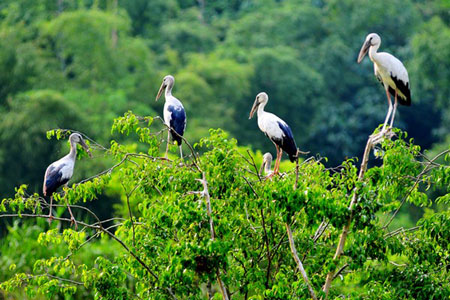
At dusk, we take a boat to the mangrove forests of Thung Nham Bird Park and wait for the flocks to return to their nests after a hard working day. Silently, we hide the boats under the trees as the noisy birds fly to their homes. Their sounds fill the mangroves.
At dusk, we take a boat to the mangrove forests of Thung Nham Bird Park and wait for the flocks to return to their nests after a hard working day. Silently, we hide the boats under the trees as the noisy birds fly to their homes. Their sounds fill the mangroves.
 |
| Nature reserve: Thung Nham houses more than 40 species of birds such as cranes, storks, heron and eagle. |
Thung Nham (Nham Valley) eco-tourism zone is located in Hoa Lu District, 12km south of Ninh Binh City. After a three-hour drive from Ha Noi, the gate of Thung Nham comes into our view.
In recent years, it has become a big attraction with tourists. The 350ha park has been developed for tourism but still retains its natural beauty.
Our tour guide Do Van Cong said the most suitable time to visit Thung Nham was in summer and spring, when the birds are busy building nests and breeding. "It's the best time for tourists to see them," he said.
 |
| Natural wonder: Tourists ride boats to visit Buddha Cave where there is a big Buddha-shaped stalactite sitting beside an underground river. |
Thung Nham Birds Park houses more than 40 species of birds, some of them named in the Red List of Threatened Species by the International Union for Conservation of Nature and Natural Resources.
The site has a rich ecosystem, including more than 100 flora and 150 fauna species. We ride the boat into the mangroves and are delighted when Cong shows us nests with many little eggs. Then he helps us identify the different birds and tells us their habits. Our children are excited because this is the first time they have had such a real lesson in biology.
"Tourists usually visit Thung Nham for one or two days, but personally, a two-day tour is necessary to enjoy the entire beauty here," Cong said. "The most wonderful time is when flocks of birds appear at dawn and dusk."
An adjacent destination is Vai Troi (Beseeching the God) Cave, which has about 3,000sq.m of space. The 439 stone steps leading to its mouth was the biggest challenge.
We felt comfortable when we reached our lofty destination. There are three levels to the cave, all containing sparkling stalactites. The three levels are known as Earth, Hell and Heaven.
 |
| One with nature: Tourists watch birds return to their nests in the mangrove's trees. — File Photos |
Entering the cave's mouth, visitors enjoy the spacious "Earth" area. All tiredness is blown away as we breathe in the cool air and enjoy the tranquil site.
Then we go down to visit "Hell", which is far from fearful with its many stalactites in a myriad of forms. Our voices disturb some bats that flap around and retreat to the darker hallows.
It is said that ancient Vietnamese people set up a sacred altar at the "Heaven" sector to pray for good weather and bumper harvests. It is the meaning of the cave's name, Vai Troi (Pray to Heaven).
Visitor Nguyen Xuan Quynh from Ha Noi said she felt wonderful while standing in "Heaven" and enjoying the panoramic view.
"The peaks of surrounding mountains are covered by cloud and fog, making it a fairyland sight," she said. "The stalactites are so special," she said. "They make different sounds when we beat on them, like a kind of musical instrument."
Adventurous tourists may like to discover Hang But (Buddhist Cave), about 500m in length. There are no electric lights, but the stalactites and stalagmites look so magical by torchlight, including a big Buddha-shaped stalactite sitting beside an underground river.
Thung Nham is surrounded by a primaeval forest where tourists enjoy trekking and see a 1,000-year-old streblus asper tree planted on a limestone hill by soldiers of King Dinh Tien Hoang (924-979), the first Vietnamese emperor after the end of Chinese colonialism.
The soldiers planted the tree in the hope that the king would live long and be as strong as the tree. Also on Nham Mountain is an ancient banyan tree. Its aerial roots cover the roof of an old shrine where the Mountain God is still worshipped.
Thung Nham also attracts many visitors thanks to an orchard of tropical fruits, including star fruit, mangoes, guavas and lychees. It is so relaxing to get away from the busy street and lanes of Ha Noi and wander around the gardens.
All the vegetables served to tourists is cultivated at the orchard.
Thung Nham is described as being suitable for one- to two-day trips. If tourists plan to stay overnight, they can stay in a stilt house in one valley as beautiful as paradise.
They can also enjoy some special dishes such as wild pig, hill chicken, fresh seafood, bamboo shoots, forest vegetables.
(Source:VNS)





![[Photo series] Admiring the most beautiful riverside road in Dong Nai before its technical traffic opening](/file/e7837c02876411cd0187645a2551379f/012026/nen_20260114174655.jpg?width=500&height=-&type=resize)